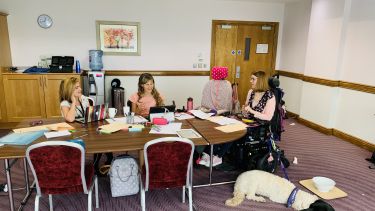Research with, not on communities: The Participatory Research Network
A cross-faculty initiative bringing together like-minded researchers who use ‚Äď or are interested in using ‚Äď participatory methods in their work.

Shifting power dynamics
Much research tends to follow a strict researcher-participant relationship, with the former doing research on the latter, or relying on secondary sources and datasets.
But an absence of lived experience can mean that issues that matter to communities are inadvertently overlooked or understudied.
Participatory research methods seek to disrupt these hierarchies by doing research with communities, rather than on them.
In partnership with research teams, groups and individuals are invited to collaborate on several stages of the research process, from designing research questions and carrying out their own data collection and analysis to sharing the impact of the project across their networks.
‚ÄúFor me, it's about accepting that there's many different forms of knowledge in the world, that there's different ways of generating knowledge,‚ÄĚ says Dr Kirsty Liddiard, senior research fellow in the School of Education and iHuman.
‚ÄúIt's about doing research that has real relevance and impact in the lives of people. If we just do it in these ivory towers on our own, there's a real disconnect between what it can do in people‚Äôs real lives.‚ÄĚ
Liddiard sees participatory research as “a form of research that engages meaningfully with the communities we work with.
"It's about acknowledging that the academic expert voice isn't the only voice, and that people's lived experience is as equally as important as academic knowledge, and involves different forms of participation to ensure that you co-create knowledge.
As academics, we can also be in, or a part of, the communities we are researching with. Having that lived experience can be really important to participatory research.‚ÄĚ
A collaborative space for participatory researchers
Just as collaboration is at the heart of participatory research, having a collaborative space where researchers can share best practice and learn from each other’s experiences is also important.
To bring together like-minded researchers who use ‚Äď or are interested in using ‚Äď participatory methods in their work, the Participatory Research Network (PRN) was set up by Liddiard in 2022.
As a relatively new network, the PRN has 15 committee members across all faculties who are passionate about creating a collective to champion different approaches to research across the University.
‚ÄúWe wanted to create a network where we could have a real interdisciplinary conversation around participatory research to see how we were doing it in different disciplines,‚ÄĚ explains Liddiard.
“In Social Sciences, I wouldn't necessarily meet a medic or an engineer, so it's about creating those spaces where people will come together, talk about research that they enjoy, and see what kinds of connections or activities come from those conversations.
"Whether it's around the impact strategy, civil engagement work, encouraging postgraduate communities to engage more in participatory research, there are so many different things we want to work on over the next few years that I think will really improve research culture at 91÷Ī≤•."
The Co-researcher Collective
Liddiard‚Äôs ESRC-funded project ‚Äď carried out with Professor Dan Goodley and Katherine Runswick-Cole from the School of Education and iHuman ‚Äď is an illuminating example of participatory research in action.
Young people with life-limiting impairments were invited to become part of a collaborative ‚ÄėCo-researcher Collective‚Äô, taking an active role in research on the lives and hopes of young disabled people like them.
The research plan was kept as flexible as possible which meant the co-researchers were able to make key decisions on the direction of the project, undertake fieldwork, collaborate in data analysis, and write, share and promote the findings.
“We had a particular way of working at the beginning, but once we had our co-researchers on board, their questions were totally different from ours as the academics.
The stories that young people tell each other are very different to what they would tell researchers, so it couldn't have been the same project or the same research findings without that collaboration,‚ÄĚ Liddiard affirms.
Participatory research is for everyone
Liddiard uses participatory methods extensively in her own work in disability studies.
‚ÄúMy work is around enabling disabled people's voices, recognising how research has been relatively harmful to disabled people in the past, how we can treat disabled people properly and ethically, and how we can meaningfully listen to their stories,‚ÄĚ explains Liddiard.
However, for disciplines traditionally rooted in scientific fact and data, such as engineering or the sciences, participatory research may initially seem like squaring a circle.
‚ÄúI don't think participatory research is only for the social sciences, far from it,‚ÄĚ Liddiard believes. ‚ÄúWe know through the PRN that participatory research is happening in many disciplines where we wouldn't normally expect to see it. There‚Äôs definitely an acknowledgement that different forms of knowledge production are important.‚ÄĚ
In 2022-2023, the University of 91÷Ī≤• funded a broad range of participatory research projects led by academics across the faculties, with the aim of supporting and encouraging participatory research to be carried out in all disciplines.
Supporting students to research with communities
Liddiard is also an advocate for better opportunities for PGRs to get involved with participatory research, as time constraints, less connections with outside organisations and heavy workloads can often stand in the way.
‚ÄúPostgraduate research is pretty exceptional and exciting, so we want to support PGRs to engage with communities in different ways and be able to do participatory research at doctoral level,‚ÄĚ explains Liddiard.
To further this work, alongside Dr Lauren White from the 91÷Ī≤• Methods Institute and postgraduate researcher Ankita Mishra from the Department of Psychology, is currently co-leading a new PRN project to better understand PGR experiences with participatory research.
‚ÄúThe project is going to collect data with PGRs across the University on what barriers PGRs are facing, and what kinds of research would they want to do in an ideal world, if they weren't confined by the doctoral process. We want to find out what more the University could do to support students to do research in and with communities.‚ÄĚ

